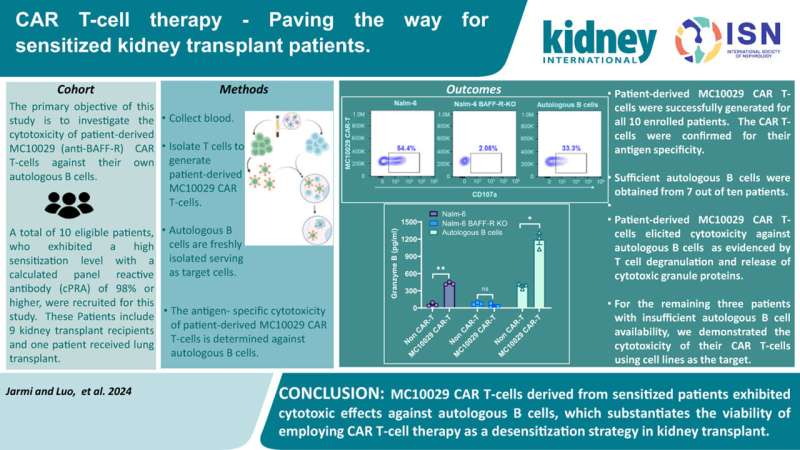This article has been reviewed according to Science X's editorial process and policies. Editors have highlighted the following attributes while ensuring the content's credibility:
fact-checked
peer-reviewed publication
reputable news agency
proofread
Could CAR-T cell therapy improve kidney transplants?

Chimeric antigen receptor-T cell therapy (CAR-T cell therapy) could provide a revolutionary approach to organ transplantation for patients who are hard to match and susceptible to rejection, Mayo Clinic researchers discovered.
Their pioneering research focuses on using CAR-T cells derived from the patient's own immune system to prevent rejection of donated organs. Sensitized patients are those who have high levels of antibodies that cause their immune systems to react negatively to potential donor organs. These patients often face extended waiting periods for a transplant.
Research from this proof-of-concept study is published in Kidney International.
"This study was designed to evaluate the feasibility of using an immunotherapy that would remove B cells that cause sensitization in patients waiting for a kidney transplant," says Tambi Jarmi, M.D., first author on the study and a transplant nephrologist at Mayo Clinic in Florida.
"This research is one of the first steps toward applying CAR-T cells in the field of transplantation to try to make more donor organs available for transplant and reduce the wait for patients who need a new kidney."
Research on CAR-T cell therapy and transplantation
Researchers in the lab of Hong Qin, M.D., Ph.D., developed a new type of CAR-T cell therapy that targets a protein known as B cell activating factor receptor (BAFF-R), which is present on B cells. B cells play a key role in regulating the immune system and generating antibodies. They investigated whether the BAFF-R CAR-T cells could target and remove B cells that cause sensitization.
For this study, researchers generated BAFF-R CAR-T cells from 10 patients considered sensitized to organ transplantation. Nine of them had undergone kidney transplants and one had received a lung transplant.
"We isolated T cells from a small quantity of the patient's blood. These CAR-T cells were then engineered to identify and neutralize B cells carrying a specific antigen, effectively targeting and eliminating the sensitizing cells," says Dr. Qin, lead author on the study, who is an immunologist and CAR-T cell researcher.
Then, the research team compared the activity of BAFF-R CAR-T cells to T cells after they were treated with B cells from healthy donors. Researchers saw a reduction in B cells from the sensitized patient group that had been treated with patient-derived CAR-T cells when compared to the non-CAR-T control group.
"Our study demonstrated that BAFF-R CAR-T cells derived from sensitized patients exhibited killing effects against B cells, which substantiates the viability of using BAFF-R CAR-T cell therapy as a desensitization strategy in kidney transplant," says Dr. Jarmi.
Mayo Clinic now is preparing to biomanufacture the BAFF CAR-T cells at its commercial-grade facilities in Florida for testing in early-stage clinical trials.
The use of BAFF-R CAR-T cell therapy to desensitize kidney transplant patients is considered experimental. It is among the first investigations into the use of this immunotherapy for diseases beyond cancer. This research is a collaboration between the Mayo Clinic Regenerative Immunotherapy and CAR-T Translational Research Program, Mayo Clinic Department of Transplant Florida and Mayo Clinic Division of Hematology and Medical Oncology.
Additional research is needed to validate the findings of this study.
More information: Tambi Jarmi et al, CAR T-cell therapy—paving the way for sensitized kidney transplant patients, Kidney International (2024). DOI: 10.1016/j.kint.2024.02.008
2024 Mayo Clinic News Network. Distributed by Tribune Content Agency, LLC.

















